
Newsletter of the
INTERNATIONAL ENVIRONMENT FORUM
Volume 18, Number 10 --- 15 October 2016
Website: iefworld.org
Article submission: newsletter@iefworld.org
Deadline next issue 13 November 2016
Secretariat Email: ief@iefworld.org General Secretary Emily Firth
Postal address: 12B Chemin de Maisonneuve, CH-1219 Chatelaine, Geneva, Switzerland
Download the pdf version
From the Editor, Request for information for upcoming newsletters
This newsletter is an opportunity for IEF members to share their experiences, activities, and initiatives that are taking place at the community level on environment, climate change and sustainability. All members are welcome to contribute information about related activities, upcoming conferences, news from like-minded organizations, recommended websites, book reviews, etc. Please send information to newsletter@iefworld.org.
Please share the Leaves newsletter and IEF membership information with family, friends and associates, and encourage interested persons to consider becoming a member of the IEF.
INTERNATIONAL ENVIRONMENT FORUM - 20TH ANNUAL CONFERENCE
Implementing the Sustainable Development Goals as communities and individuals
Nur University, Santa Cruz, Bolivia, 7-9 October 2016
INTERIM CONFERENCE REPORT
NOTE: The conference proceedings were all in Spanish, except for translation for two English-speaking keynoters. This interim report provides an outline of the conference, but we are awaiting the Spanish version of the conference report to fill out many details of content. The main conference sessions were recorded on video, and links to these on YouTube will be provided as these are edited and become available. It should then be possible for those who understand Spanish to experience the conference in some detail. We hope that it will be useful to our members and friends in Latin America.
Introduction
With the launching of the United Nations 2030 Agenda and its Sustainable Development Goals approved at the UN General Assembly Summit last September, governments and the international community are heavily involved in implementation at the national level and in creating the relevant indicators and supporting measures. However, governments will not be able to reach these ambitious goals without widespread public support and involvement, and little has been done to make the SDGs accessible and relevant to the public. What has largely been a top-down process needs to be accompanied by a bottom-up process of public buy-in and participation. This conference explored implementing the SDGs as communities and individuals.
The conference focused on three issues that concern everyone, and are of particular interest to Latin America:
• Responsible and sustainable lifestyles (SDG12)
• Values and education (SDG4)
• Sustainable urban communities (SDG11)
Lifestyles are an obvious starting point, since they are individual as much as collective. A lot of work has gone into preparing the 10-year Framework of Programmes on Sustainable Consumption and Production, including its educational component, and a global network on Education for Sustainable Living has been set up. The challenge now is adaptation to local situations and implementation. Discussion under this issue included the use of the SDG framework to encourage responsible and sustainable lifestyles in individuals, families and neighbourhoods.
Education is a cornerstone of the SDGs, both with its own goal and cutting across all the other goals. The fundamental transformation at all levels required by the SDGs will depend on strong motivation and changes in behaviour, and for this ethics and values are as important as information. Values-based education is an emerging area of practice with the potential to set youth on a path of responsibility and service. This issue provided an opportunity to share experience and to consider new directions.
With Habitat III, the United Nations Conference on Housing and Sustainable Urban Development (https://www.habitat3.org/), being held in Quito, Ecuador, the week following the IEF conference on 17-20 October 2016, it was logical to consider the challenges of building sustainable urban communities. In many places, local governments have already taken the lead in transitioning towards sustainability. Beyond this, community-building depends on a number of neighbourhood processes including action, reflection, consultation and study that build trust and solidarity, and that empower a community to take charge of its own destiny. The SDGs can help to give communities a common vision and targets for a more just and sustainable future.
The IEF 20th Conference provided an opportunity to dialogue and reflect about these elements of the SDG framework. What are the expectations, challenges and guidelines for achieving the progress needed? How to ensure social inclusion and participation? What are the implications for science, social action and policy?
Opening Session Friday evening 7 October
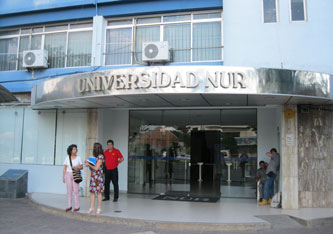 .
.
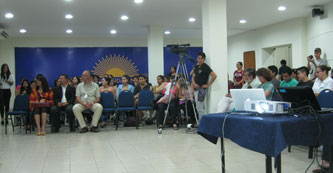
Nur University; opening session
The Rector of Nur University, William Shoaie, opened the conference before a full auditorium of over 150 including many students, and welcomed the participants to this Baha’i-inspired university. Griselda Torrico chaired the session and introduced the partners contributing to the conference: the International Environment Forum, the PERL/UNITWIN network based at Hedmark University of Applied Sciences (Norway) through which the Swedish Government provided travel support for some speakers, and Nur University. She explained the conference theme and its interest for the region.
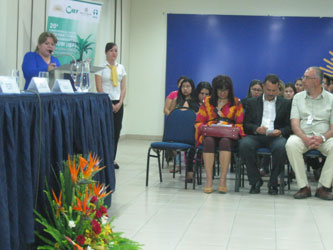 .
.
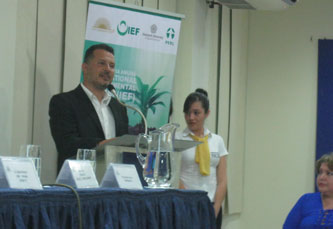
Opening by the university; Rector William Shoaie
The first keynote was by Isabel Martinez, representing the United Nations Environment Programme (UNEP) Regional Office for Latin America and the Caribbean in Panama. She spoke on “Responsible Lifestyles and Sustainability Challenges and Expectations”, introducing the Sustainable Development Goals, the global action plans for education for sustainable development, and UNEP’s work on education in the region.
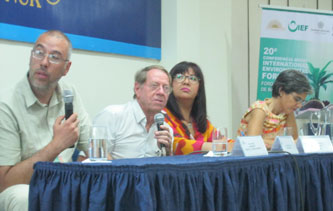 .
.
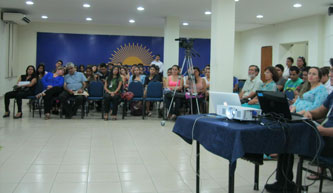
Javier Gonzales (interpreter), Arthur Dahl, Griselda Toricco, Isabel Martinez
Arthur Dahl, President of IEF based in Geneva, Switzerland, gave the second opening keynote on “Looking at the Sustainable Development Goals from the bottom up”. He noted that the Sustainable Development Goals adopted at the UN Summit in September 2015 resulted from one of the widest consultation processes in UN history involving governments, UN agencies, the scientific community and civil society organizations, representing a global consensus on aspirational goals for the planet by 2030. However, successful achievement of the goals will require more than top-down action at the global and national levels. These are goals "of the people, by the people and for the people" so everyone needs to be involved, but little has yet been done to bring the SDGs to the public and to encourage universal participation in their implementation. This was the motivation for this IEF conference.
He showed that there are many elements of the goals and targets that lend themselves to public involvement. At least 107 of the 169 targets under the goals can be implemented directly at the community level. Communities should prepare their own local Agenda 2030s with their specific SDGs, just as they prepared local Agenda 21s after the 1992 Rio Earth Summit. Individuals can also adopt their own SDGs with their individual targets for a responsible lifestyle of social justice, economic transformation and environmental sustainability. He shared a list of individual targets for the SDGs inspired by the global targets but suitable for everyone (below). A written version of his paper with complete lists of community and individual targets is available at https://iefworld.org/ddahl16j, and his presentation will be available on the IEF web site.
After some questions and comments, the evening closed with a reception.
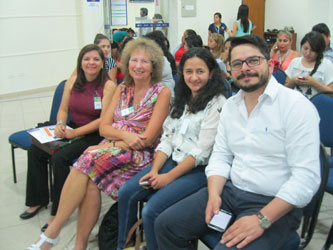 .
.
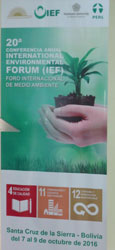
Speakers: Alicia Jiménez, Victoria Thoresen, Patricia Vilchis Tella, Kenneth Ochoa
Saturday 8 October
The remainder of the conference continued with a core of about twenty participants, which allowed for meaningful exchanges. The day began with two keynotes. The Rector of Nur University, William Shoaie, spoke on “Collective leadership as the basis for social transformation”, sharing experience from the implementation of the unique curriculum for development change agents at Nur University. Motivation comes from seeing the common good in what is collective, and developing capacities for collective action. Individual distinction comes from being a source of social good, bringing peace and well-being, happiness and goodness to our fellow human beings. Teachers can become agents for community change, and youth can be leaders. He described the “super powers” needed for moral leadership.
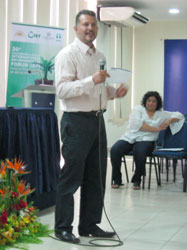 .
.
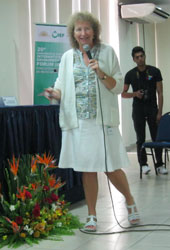
William Shoaie, Victoria Thoresen
Victoria W. Thoresen, Director of the PERL/UNITWIN network at Hedmark University, Norway, and UNESCO Chair for Education about Responsible Living, addressed “The role of values, caring and creativity in achieving ‘the good life’ (buen vivir).” She wondered whether, just as quantum physicists hypothesize parallel universes, we were not experiencing parallel realities. On the one hand we see impending economic collapse, environmental destruction, inequality and individual despair. At the same time new technologies and social innovation are transforming society. Is the world just repeating cycles, or do we see a developing civilization on an upward spiral. The SDGs suggest that humanity can work together for a better future, but they are only a framework and we have to give them life. We need an ernest examination of our understanding of human nature and of our cultural frameworks, looking beyond the numbers of the public management paradigm to values and friendships. She then discussed each of the elements of her title.
Values are the dynamic force for social change. But what are our values? What do we prioritize in our lives? Most people do not have words to discuss this issue. There is often a values or knowledge/action gap, between what we want to do and what we actually do. We need to look at our values through action and reflection, and see how they show in our daily life.
Caring is not an easy subject to approach academically, but it is the power for change. Sustainable lifestyles are enabled by efficient infrastructure and individual choices and actions. Learning to care leads to constructive action, in how we organize our life, socialize, share, learn and educate. The UNEP stocktaking report “Pathways to Sustainable Lifestyles” showed that each region has different needs. PERL has produced values-learning toolkits, where students can learn to be stewards of the planet and to care for their communities, and LOLA - Looking for Likely Alternatives - on social innovation in communities.
Creativity is needed to transform our inner life and outer conditions, helping us to become more fully human in a dynamic balance of the material and non-material sides of life. Friendships, collaboration, trust and compassion are non-material but important. We need to acquire an understanding of systems and processes, and gain insights into the interconnection of all things. We need to recognize that our understanding changes and grows, and that what we thought was right may not always be so. It is hard to reprogramme the habits of daily life, for which we need humility. This can inspire a capacity for service to foster a vibrant community with a keen sense of purpose.
These are the foundations for a global, transformative citizenship leading to compassionate connectedness based on empathy, collective social learning, moderation and sharing. The horizon looks bright, but there is a lot of work to do. (presentation)
After some discussion with the public, the conference continued with a series of presented papers on the themes of Values and Education (SDG4), Sustainable Urban Communities (SDG11) and Responsible and Sustainable Lifestyles (SDG12).
EDUCATION
SDG 4 on Education includes reference to the 10 Year Framework of Programmes on Sustainable Consumption and Production (10YFP) approved at Rio+20 and incorporated into the targets under this goal. The speakers approached the issue from global, national and local perspectives, including both theory and practice.
Long-time IEF friend Alicia Jimenez of the Earth Charter Initiative in Costa Rica, spoke on “Education and Values: the Earth Charter and SDG 4”. See described the vision of education described in SDG 4 as incorporating other education agendas for sustainable development (UNESCO), sustainable lifestyles (UNEP 10YFP), global citizenship, human rights, gender and peace. This is transformative education, understanding the present situation in an integrated and systematic way, and including values. She asked how can we use educational processes to cultivate a more ecological vision of the world, leading to new models of behaviour that lead to a more just and sustainable way to live in the world? It should use values such as social justice, sustainability and peace to create transformative moments, with a world vision changing from ego to eco, involving body, mind and emotions. These values are incorporated in the Earth Charter which aims to lead from guiding principles to action. She described many educational materials that the Earth Charter Education Centre has prepared. (presentation)
She was followed by Julio Mantilla of the Bolivian Ministry of Education, who shared his ministry’s programme of education for cohabitation of mother earth and community health. It incorporates scientific, productive, political and spiritual dimensions for living well in the community. There are components on the environment, climate change, resource management and community health, as well as intercultural, intercultural and multilingual dimensions. The ministry has produced manuals and training guides to implement this curriculum. (presentation)
Juanita Hernandez described a conceptual model of environmental leadership. She started by analyzing present attitudes towards the environmental crisis, mostly of those either a part of the problem by contributing to environmental destruction, or at best a simple spectator, with few seeing themselves as part of the solution. Reasons for inaction include not knowing what to do, not feeling that doing something will make any difference, or denying that there is a problem. We are living in a time of transition in civilization, when a creative minority with a clear vision of the future can have a decisive influence once it reaches 2% of the population and creates a tipping point towards new behaviour. Building a transformative capacity involves developing capacities during cycles of learning, transforming mental models into conceptual models, motivation founded in principles and values, and achieving coherence and the ability to accompany others in service to the common good. Since people start with mental models acquired unconsciously in childhood and adolescence, rooted in habits and often containing contradictions, they need to be made conscious and questioned in order to replace them with newer conceptual models that are conscious, logical, coherent and evolutive. This means questioning common assumptions that human wellbeing is proportional to economic growth, that focus on short term benefits, that humanity is independent of nature which is there for its benefit, that there are ample resources and that nature can endure, that image determines worth, and that we are not responsible.
She presented a conceptual model developed by the Association for Science and Moral Education in Costa Rica, while emphasising that there is no single correct model as long as they combine science and moral principles. Environmental leadership includes the organic relationship between man and the environment, the rational use of natural resources, working together, responsibility for the common good, spiritual growth through motivation based on values, and a vision of an ever-advancing civilization. To identify and develop capacities for environmental leadership, the impacts of human activities on environmental systems should be observed and monitored, organizations and associations should be formed to coordinate strategies and efforts to conserve natural resources and use them sustainably, and these should design and plan actions to protect and conserve natural resources. In each local situation, specific technical capacities may be needed as well. (presentation)
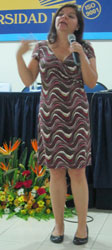 .
.
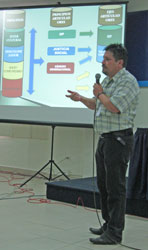 .
.
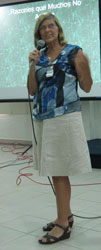 .
.
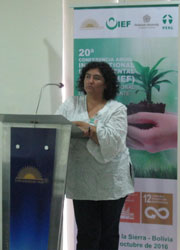
Alicia Jimenez, Julio Mantilla, Juanita Hernandez, Fabiana Mendez
Continuing the educational theme, Ninostka Burgoa and Loly Vargas of Bolivia Indaga, described their workshops in education for the conservation of the cultural and natural heritage of Bolivia based on questioning, action and reflection. They are collaborating with the National Museum of Natural History of Bolivia in “Investigation Trails” used at the museum and in the field to awaken reflection, discovery and better decision-making in exploring the environment and museum exhibits. Their programmes reach many school children with messages about science and the environment. (presentation)
They were followed by Fabiana Méndez Raya, Director of the National Museum of Natural History of Bolivia, and one of the conference organisers for IEF. She spoke on the new role of museums to support building sustainability. The museum provides a space for exchanges and collaboration between scientists, communities and individuals on sustainable development and the natural heritage, integrating indigenous populations. It supports quality education both by going to schools and receiving classes at the museum.
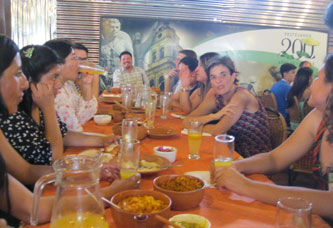 .
.
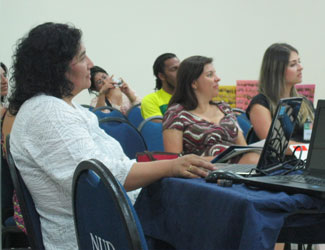
Luncheon break, part of the audience
SUSTAINABLE URBAN COMMUNITIES
Christian Bonblat, Director of CEASIP, the Centre for Applied Ecology of the Patiño Foundation (Bolivia), described their productive projects on a 180 hectare site combining a social model with soil restoration, biodiversity and energy efficiency. The government has promoted deforestation leading to land degradation, aggravated by more extreme variability in rainfall from climate change. The centre’s agro-ecological platform for sustainable agriculture encourages diversification, rotation and agroforestry, as well as respect and self-esteem. It has extension programmes in schools, prisons and fairs. (presentation)
Patricia Vilchis Tella, Research Associate at the Stockholm Environment Institute (SEI) in Sweden, spoke on the SDGs and our lifestyle, with special reference to the 10YFP. SEI is interested in sustainable lifestyles and education, and is involved in multidisciplinary research and collaboration. It has prepared a background report on sustainable lifestyles, and has projects on sustainable cities, business investment and strategic communications. She described several research projects, with the aim of speeding up implementation over the next two years and increasing impact on policy-makers.
Bringing things down to a very practical level, Cristina Arcos of Cochabamba, Bolivia, described the incentives and challenges that an individual family can face in the search for sustainability, using the example of an attempt to build a completely sustainable family house with bio-architecture, passive ventilation, solid and liquid waste recycling. She described research needs, and the importance of government facilitation of personal initiatives.
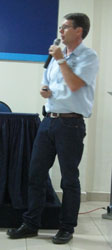 .
.
 .
.
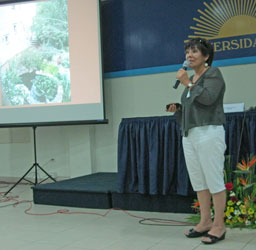
Christian Bonblat, Patricia Vilchis Tella, Cristina Arcos
Concluding this theme, Javier Gonzales of Nur University in La Paz, the other main local organiser of the conference for IEF, gave a photographic vision of bicycle use in Latin America, with public bicycles in Bogota, Lima and Santiago, and increasing use of bikeways.
RESPONSIBLE AND SUSTAINABLE LIFESTYLES
The first presentation on this theme was by Roberto Vilde, Foundation for the Conservation of the Chiquitano Forest, Bolivia, on the value of ecosystem services and the role of civil society organizations in the implementation of SDG 12. Starting with the overshooting of the planetary boundary for biodiversity and the targets for more sustainable lifestyles and education, he described their work in the environmentally and socially vulnerable Chiquitano dry forest between Bolivia, Brazil and Paraguay. He showed examples of managing water and non-wood forest products at local and regional scales, with both environmental and social benefits. (presentation)
Eliana Peca from the Viceministry for the Protection of Consumers’ and Users’ Rights of Bolivia described the provisions of the consumer protection law 453 of 2013 and subsequent regulations which provided very complete coverage. The law guarantees the rights to health and physical integrity, protection, access to food, information, equitable treatment and free choice. It covers such things as labelling, abusive clauses, contracts, guarantees, and deceptive advertising. (presentation)
In their paper on “Conservation, markets and justice: the experience of participative forest management in the village of Monkoxi de Lomerio”, Mirna Inturias of Nur University and Iokiñe Rodriguez of the University of East Anglia (UK) described a case study by Nur University of one part of the Territories of Original Communities, in which land title to 20 million hectares (out of a potential 40 m) has been returned to the local inhabitants, covering about 70% of the forest potential of Bolivia. The project made video recordings of oral testimonies, economic games, roundtables, community assemblies and interventions at the United Nations in New York.
Johana Botero of the Academy of Innovation for Sustainability (AISO) in Colombia, described their work on sustainable entrepreneurship and green markets. As a member of OECD, Colombia agreed at the Paris Climate Conference to reduce its greenhouse gas emissions by 20% by 2030. This is captured in the Colombian Strategy for a Low-carbon Economy, the National Development Plan, and the National Plan for Green Markets.
She was followed by Kenneth Ochoa, head of the Environmental Engineering programme at the Universidad de El Bosque, Bogota, Colombia. He first summarized some of the present challenges. We buy things we don’t need with money we don’t have to impress people we don’t like. Real GDP is growing faster than population, but 1.1 billion lack potable water, 7 million are killed annually by air pollution, 4-6 million tonnes of plastic enter the ocean each year, 30% of food is wasted while 800 million go hungry and 500 million are underweight. Resource extraction is still rising, so how do we decouple economic growth from environmental impact? Since many people in Bogota spend hours commuting in buses, his university offers classes by radio in the buses, making the city a campus. Eight courses in responsible consumption are offered, reaching 500,000 people. The courses create favourable conditions for economic, social and cultural transformation. The aim is not be be like others, but be what we are.
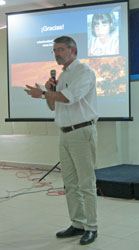 .
.
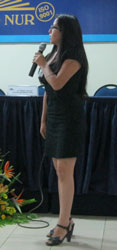 .
.
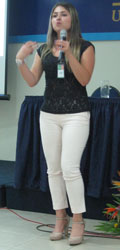 .
.
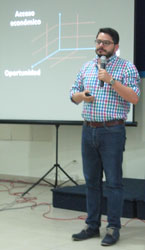
Roberto Vilde, Eliana Peca, Johana Botero, Kenneth Ochoa
After the presentation of all the papers, the conference was adjourned until Sunday morning.
Closing session Sunday 9 October
The aim of the first Sunday session was to allow a free-ranging consultation among all the participants, integrating across the different themes and exploring possible directions for the future. Javier Gonzales facilitated the discussions and ensured that everyone had a chance to contribute.
To launch the discussion, Isabel Martinez of UNEP reviewed some of the highlights of the previous day’s presentations, and Arthur Dahl of IEF provided some reflections on the broader ethical dimensions of each of the themes and the related issue of climate change drawn from recent statements of the Baha’i International Community.
4. Ensure inclusive and equitable quality education and promote life-long learning opportunities for all
Education must be lifelong. It should help people to develop the knowledge, values, attitudes and skills necessary to earn a livelihood and to contribute confidently and constructively to shaping communities that reflect principles of justice, equity and unity. It should also help the individual develop a sense of place and community, grounded in the local, but embracing the whole world. Successful education will cultivate virtue as the foundation for personal and collective well-being, and will nurture in individuals a deep sense of service and an active commitment to the welfare of their families, their communities, their countries, indeed, all mankind. (Bahá'í International Community. Valuing Spirituality in Development: Initial Considerations Regarding the Creation of Spiritually Based Indicators for Development, 1998)
11. Make cities and human settlements inclusive, safe, resilient and sustainable
Our challenge... is to redesign and develop our communities around those universal principles -- including love, honesty, moderation, humility, hospitality, justice and unity -- which promote social cohesion, and without which no community, no matter how economically prosperous, intellectually endowed or technologically advanced, can long endure. (Bahá'í International Community, 1996. Sustainable Communities in an Integrating World)
12. Ensure sustainable consumption and production patterns
...the transformation required to shift towards sustainable consumption and production will entail no less than an organic change in the structure of society itself so as to reflect fully the interdependence of the entire social body—as well as the interconnectedness with the natural world that sustains it. (Bahá'í International Community, Rethinking Prosperity: Forging Alternatives to a Culture of Consumerism, 2010)
13. Take urgent action to combat climate change and its impacts
Much has been said about the need for cooperation to solve a climate challenge that no nation or community can solve alone. The principle of the oneness of humankind... seeks to... anchor the aspirations of individuals, communities and nations to those of the progress of humanity.... As children, women, men, religious and scientific communities as well as governments and international institutions converge on this reality, we will do more than achieve a collective response to the climate change crisis. We will usher in a new paradigm by means of which we can understand our purpose and responsibilities in an interconnected world.... (Bahá'í International Community, Seizing the Opportunity: Redefining the challenge of climate change, 2008)
The following discussion filled the morning, with frequent bursts of laughter at the recognition of widely-shared experiences and challenges. Common interests were identified, possible collaborations were explored, the specificities of Latin America emerged, and everyone felt that they emerged from the consultation enriched with new perspectives and visions of ways forward.
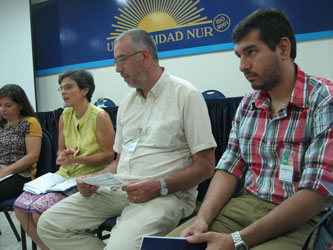 .
.
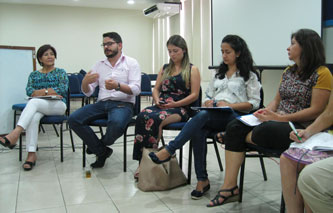
General discussion
In the final session of the conference, the chair invited the representatives of the different collaborating organizations in the conference to make closing remarks.
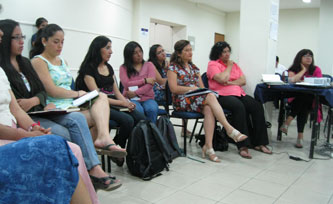 .
.
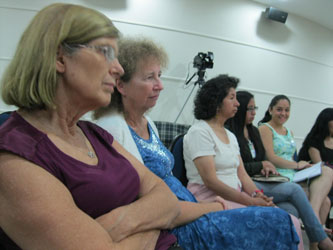
General discussion
Isabel Martinez of UNEP highlighted the importance of interconnections and building links between efforts. She referred to the five priorities of the 2030 Agenda, and the need for values like trustworthiness and love to take them forward. She discussed some of the special challenges in Latin America in making the necessary transition, but step by step that change would be possible. It was necessary to find out what everyone is doing, and to work for a convergence on values and goals.
There was a wide-ranging discussion on ways to carry these issues forward based on a shared vision and motivation. Alliances between governments and civil society organizations in Latin America needed to be strengthened. More could be done in teacher training and in producing materials for continuing education. Participants considered how to continue working together, and what to do differently. More could be done on community participation, and holding meetings to encourage interactions. It was recommended that the results of this meeting be actively promoted.
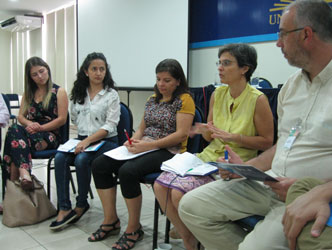
Arthur Dahl, President of the IEF, made some closing remarks. The International Environment Forum planned this conference to catalyze a process to bring the SDGs to the local level, with a bottom-up approach to complement the initiatives by governments and the United Nations. The conference recognized the importance of values in motivating change, in complement to scientific approaches. It was able to draw on the diversity of backgrounds, ages and experience represented among the participants. How exciting it was to see all the initiatives here in Latin America, in universities, museums, civil society organizations, communities and individuals, with so much practical experience on the ground to build on. You need to find ways to take this forward appropriate to your region, while IEF and other international organizations here will take it to the global level.
The frequent laughter in the consultation showed how well you captured your shared experience in the spirit of the conference. Everyone contributed actively, and we hope that you have gotten all you wanted out of it. The wonderful gender balance showed that women are leading in this important area and have the strength and initiative to accomplish much more in the future.
The IEF will try to capture the essence of this conference in the illustrated conference report on its web site (https://iefworld.org/conf20) in both English and Spanish, with links to the video recordings of the main sessions and to the presentations for those who want to go deeper. This will allow the many others who would like to have been here to share in the conference results. You can publicize this on your networks. We hope that we all can continue to walk on the path towards sustainability together.
After expressions of thanks for all concerned, including Nur University for hosting the conference so well, the PERL/UNITWIN network, the Swedish Government for supporting the travel of some speakers, local IEF members Fabiana Mendez and Javier Gonzales and IEF President Arthur Dahl, the conference was closed.
The conference was followed by the Annual General Assembly of the International Environment Forum (see formal report on IEF web site).
Report of the IEF 20th Annual General Assembly
The 20th IEF Annual General Assembly was held at Nur University in Santa Cruz de la Sierra, Bolivia, on 9 October 2016, after the close of the IEF Conference. IEF President Arthur Dahl opened the meeting and welcomed IEF members and guests present. After introductions from members present, the agenda was approved and IEF Governing Board for the coming year was elected with votes in person and my email. The Governing Board elected for 2016-2017 consists of Arthur Dahl, Victoria Thoresen, Emily Firth, Sylvia Karlsson-Vinkhuyzen, Duncan Hanks, Wendi Momen and Ian Hamilton.
The Annual Report March 2015-September 2016, which had previously been sent to all members, was summarized by the president and approved by the General Assembly, with appreciation for all that had been accomplished. It is available on the IEF web site at https://iefworld.org/report2016. The General Assembly approved an addition to the By-laws allowing the Governing Board to co-opt additional non-voting members.
In its consultation on activities and priorities for the coming year, the General Assembly suggested that implementation of the Sustainable Development Goals continue to be a major issue for IEF, building on the results of the present conference. It discussed the possibility of the next conference being held in Ottawa, Canada, with a theme of migration, integration and global citizenship. There were also hopes that another conference could be held in Latin America. There were proposals that IEF should develop guidelines and suggestions for communities and individuals to encourage and guide them in making sensible environmental planning decisions about their activities, and guidelines for the study, career and life choices that might begin to define something of the character of Baha’i communities. In response to the question as to what might be the needs and exigencies about which we should be anxiously concerned and upon which we should center our deliberations, it was suggested that the issue of migration and integration is a global priority on which the IEF should be able to make a useful contribution. Nur University is collaborating with the University of East Anglia (Norwich, UK) on the positive transformation of environmental conflicts, and this could contribute to the work of IEF and draw on the IEF network.
Since there was no other business, the General Assembly closed with appreciation for the contribution of all those present. The formal report is on the IEF web site at https://iefworld.org/genass20.
WHAT CAN YOU DO TO IMPLEMENT THE SUSTAINABLE DEVELOPMENT GOALS?
An adaptation of the SDGs for individuals
Goal 1. No poverty
Contribute to local efforts to eliminate poverty in your community
Goal 2. Zero hunger
Support community efforts to ensure everyone access to safe, nutritious and sufficient food all year round
Encourage and support local small-scale food producers
Support sustainable food production systems that improve land and soil quality
Goal 3. Good health and well-being
Choose a healthy lifestyle for yourself and your family
Avoid narcotic drugs and harmful use of alcohol
Drive safely
Plan your family size
Avoid using hazardous chemicals, try not to live in polluted areas
Goal 4. Quality education
Get the best education possible, and educate your children
Give your small children pre-primary education
Help others to get skills for employment, decent jobs and entrepreneurship
Encourage education for girls and the vulnerable
Educate yourself, your family and community about sustainable development and sustainable lifestyles, human rights, gender equality, peace and non-violence, global citizenship and appreciation of cultural diversity
Goal 5. Gender equality
Avoid discriminating against women and girls
Shun violence against women and girls
Share responsibility within your household and family
Encourage women's participation in leadership and decision-making
Support women's equal rights
Promote the empowerment of women with technology
Goal 6. Clean water and sanitation
Encourage safe drinking water and sanitation, practice good hygiene
Avoid polluting water
Use water efficiently
Contribute to improving water and sanitation in your community
Goal 7. Affordable and clean energy
Prefer renewable energy sources
Use energy efficiently
Goal 8. Decent work and economic growth
Consider a career in a sustainable productive activity involving creativity and innovation
See your work and that of others as a service to the community
Help young people to find training and employment
Encourage all workers' rights to a safe and secure working environment, including migrants
Goal 9. Industry, innovation and infrastructure
Work to improve your local community infrastructure
Look for ways to make your workplace more resource-efficient and sustainable
Learn to use information and communications technologies and help others
Goal 10. Reduced inequalities
Participate in the life of your community, and empower others irrespective of age, sex, disability, race, ethnicity, origin, religion or economic or other status
Support equal opportunities for everyone in the community
Be welcoming to migrants, since you may also migrate
Goal 11. Sustainable cities and communities
Choose your housing to be safe and sustainable
Use sustainable forms of transport
Participate in the sustainability planning of your local community
Protect your local cultural and natural heritage
Reduce your vulnerability to disasters
Contribute to community gardens and green spaces
Goal 12. Responsible consumption and production
Consider sustainable natural resource use in your purchases
Stop wasting food
Reduce your use and release of chemicals
Reduce your wastes through prevention, reduction, recycling and reuse
Inform yourself, and help to educate others about sustainable development and lifestyles in harmony with nature
Goal 13. Climate action
Educate yourself and others about climate change mitigation, adaptation, impact reduction and early warning
Goal 14. Life below water
Reduce your use of plastics and dispose of them responsibly
If you live near the coast, support coastal (river, lake and lagoon) protection
Avoid releasing chemicals, and other toxic products into the water
Goal 15. Life on land
Support the conservation and sustainable use of terrestrial and freshwater ecosystems, especially forests, wetlands, mountains and drylands
Use paper, wood and charcoal from sustainable forestry
Protect local natural habitats and biodiversity
Goal 16. Peace, justice and strong institutions
Avoid all violence
Protect children from abuse
Fight local corruption
Demand accountability and transparency from your local institutions
Participate in local decision-making
Avoid all discrimination in your community
Goal 17. Partnerships for the goals
Contribute time and resources to local sustainability efforts
Invent, adopt and share environmentally sound technologies
Join in local partnerships for sustainability
The Wilmette Institute's contribution to Global Climate Change Week
10-16 October 2016
The Wilmette Institute organized an Activity Page for learning, reflection, discussion, and action for Global Climate Change Week.
The page was dedicated to Paula Bidwell, our dear Native American co-worker, whose feet walked both the spiritual and practical paths to unite Earth and spirit, and who stood up against the excesses of the fossil fuel industry driving climate change.
Everyone is invited to use this Activity Page for personal study, and to discuss it in the forum. It takes about 5 minutes to read the text, but more time if you decide to watch the videos. We especially recommend the 10 minute video “Tanna after Cyclone Pam” in the section “The Baha'i Community and the 5 Year Plan” below.
Introduction – Climate Change
Many of our brothers and sisters around the world are already suffering from serious impacts of climate change. Heat waves in many parts of the world are worsening and poor people, who don't have access to air conditioning, are dying. Droughts, floods, and storms are becoming more extreme everywhere and sea level rise has begun to be a serious problem for islands and coastal communities around the world. Agriculture is already affected, which contributes to crop failures, higher food prices, hunger, and malnutrition.
Prospects for the future are grim. According to the World Bank, climate-change related natural disasters will put 1.3 billion people at risk by 2050. Many people will be displaced. How will we be able to accommodate the estimated 27 million people in Bangladesh alone who may lose their homes because of sea level rise by 2050?
Atmospheric concentrations of greenhouse gases have increased to a level that hasn't been seen in millions of years and are unprecedented in human history. Their increase is mainly caused by burning coal, oil, and gas, and by deforestation.
Since there is a time lag of several decades between greenhouse gas emissions and climate impacts, we have not yet experienced the full consequences of our actions. Moreover, the release of greenhouse gases continues and is even increasing every year. We already have reached a point of no return as the current atmospheric concentrations will impact the climate for many hundreds of years before natural processes can return carbon dioxide to safe levels. The current trajectory with business as usual will result in a climate catastrophe. If very strong actions are taken soon at all levels, we may still have a chance to keep the warming of the Earth limited to a point that would allow human beings to survive and eventually even thrive. However, there is not much time left to act.
We encourage you to learn a little bit more about climate change and suggest one or both of the following two talks by Dr. Katharine Hayhoe, who is an Evangelical Christian and an atmospheric scientist:
• TEDxTexasTechUniversity
• Let's Talk About Global Warming! 92min., recommended for those who would like to learn more. Talk given at the Parliament of the World's Religions, Oct. 2015
What is Being Done to Mitigate (Reduce) Climate Change?
The international agreement at the 2015 Paris Climate Conference (COP21) was a great achievement in humanity's development towards a world federation. For the first time in human history, 195 nations unanimously agreed on an issue, namely that it is of greatest importance to keep global average temperature rise “well below 2°C”. However, COP21 was a failure in adequately addressing the problem, because the commitments offered by the assembled nations fall short of what is needed to achieve this goal.
Political systems have proven incapable of averting a major climate crisis because they are restricted by nationalism, manipulated by corporate interests, and limited by short-term political maneuvering. That is in contrast to the efforts of Baha'is all over the world who are gradually building the foundation for a new spiritual society that is concerned with the well-being of all people including poor people and future generations who are now and will in the future suffer the most from climate change impacts.
The Baha'i Community and the 5 Year Plan
The Baha'i International Community has issued thought-provoking statements and has been supporting international efforts to mitigate climate change. The US Baha'i Office of Public Affairs is also working on issues of sustainability and climate change, especially in collaboration with interfaith organizations. At the same time, it is important that Baha'is are becoming engaged in these efforts from the grassroots up.
Climate change is an important additional reason why we need to focus on the 5-Year Plan and its core activities:
• Devotional meetings turn our hearts toward God and fill them with love for all of humankind. They can motivate us to learn about people who are already suffering from the impacts of climate change and about the existential threat to future generations, and to do some changes in our own lives to reduce greenhouse gas emissions.
• Study circles promote education and develop human capacity for service which includes efforts to reduce greenhouse gas emissions and planting trees at the community level.
• Children and youth classes help raise an educated generation of world citizens focused on service, who will be capable of addressing social problems, including The Institute Process has already proven to be helpful to people affected by climate change impacts. You may remember the devastating cyclone Pam that hit Vanuatu in March 2015. The severity of such storms increases on average in a warmer world.
We suggest that you watch Tanna After Cyclone Pam (10:45min.) This moving video shows how the efforts of the Baha’is to build local capacity and responsibility increased the community’s resilience in the face of this disaster.
Collaboratively organizing or assisting relief efforts after disasters have struck is one important role the Baha'i community and its wider circle of friends can contribute to. However, there are limits to adaptation, and for many low-lying islands it is already too late to secure their future.
Therefore it is even more important to do everything in our power to limit global warming to the lowest level that is still possible. Strong measures in all sectors of human activity must be taken to reduce greenhouse gas emissions as quickly and as effectively as possible.
We encourage you all to become part of this global effort in your individual and community lives. Often we have an option to bike or car pool to our meetings. We can use less energy and eat less meat to reduce methane emissions and deforestation, and most importantly, all of us can significantly lower our consumption, in other words, we can buy a lot less stuff. Last, but not least, we can all learn more about climate change and teach our youth and children.
Reflection
Think about the following quotation by Baha'u'llah and how it can be applied to the climate crisis:
Whoso cleaveth to justice, can, under no circumstances, transgress the limits of moderation. … The civilization, so often vaunted by the learned exponents of arts and sciences, will, if allowed to overleap the bounds of moderation, bring great evil upon men. ... If carried to excess, civilization will prove as prolific a source of evil as it had been of goodness when kept within the restraints of moderation. Meditate on this, O people, and be not of them that wander distraught in the wilderness of error. The day is approaching when its flame will devour the cities, when the Tongue of Grandeur will proclaim: “The Kingdom is God’s, the Almighty, the All-Praised!”
Questions to think about:
• Why is the application of justice so important in the context of climate change?
• What role does moderation play in mitigating climate change?
• What are the evils of a material civilization that is carried to excess?
Activity
Take one or more actions in your personal or community life to reduce greenhouse gas emissions. For ideas, go here (scroll down to Section 5: Actions of Individuals).
Discussion
We encourage you to share and discuss your reflections about the above quotation and your practical actions to mitigate climate change with the Wilmette Institute community in this forum.
Updated 25 October 2016
|
